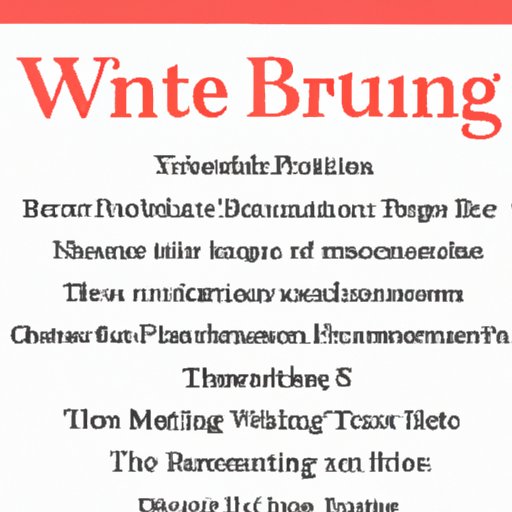Introduction
Writing prompts are questions, sentences, or images used to help writers generate ideas for their writing. They can come in many forms, from open-ended questions to specific instructions. Writing prompts can be used by writers of all skill levels to jumpstart their creative process and encourage them to explore new ideas and perspectives.
Exploring the Different Types of Writing Prompts
When it comes to writing prompts, there are several types to choose from. Each type of prompt has its own set of benefits for writers, depending on their needs and goals. Here are a few of the most common types of writing prompts:
Open-Ended Writing Prompts
Open-ended writing prompts are questions that allow the writer to answer in any way they choose. These prompts are great for encouraging creativity and exploration. Examples of open-ended writing prompts include: “What would you do if you had the chance to travel back in time?” and “If you could have one superpower, what would it be?”
Closed Writing Prompts
Closed writing prompts provide specific instructions for the writer to follow. These prompts can help the writer focus on a particular topic or idea. Examples of closed writing prompts include: “Write a story about a character who discovers a secret room in their home” and “Describe your favorite place in nature.”
Narrative Writing Prompts
Narrative writing prompts are focused on telling a story. These prompts often ask the writer to create a character or situation and then tell the story from that character’s perspective. Examples of narrative writing prompts include: “Write a story about a family reunion that goes wrong” and “Create a character and write a story about their journey to find themselves.”
Expository Writing Prompts
Expository writing prompts are focused on providing facts and information. These prompts often ask the writer to research a topic and provide details on the subject. Examples of expository writing prompts include: “Research the history of the American Civil War” and “Describe the effects of climate change on the environment.”
How to Use Writing Prompts Effectively
Using writing prompts effectively requires some pre-planning. The following steps can help writers get the most out of their writing prompts:
Brainstorm Ideas
Before getting started with a writing prompt, take some time to brainstorm ideas. Think about the prompt and consider different ways to approach it. Jot down any interesting thoughts or ideas that come to mind. This will help the writer to focus their writing and get the creative juices flowing.
Pre-Writing Strategies
Once the writer has finished brainstorming, they should take some time to review their ideas and develop a plan for their writing. Pre-writing strategies such as outlining, clustering, and freewriting can help the writer to organize their thoughts and create an effective structure for their writing.
Developing a Writing Plan
Once the writer has created a plan for their writing, they should develop a timeline for completing it. Establishing a timeline helps to keep the writer on track and ensure that they finish their project on time. It also helps to break the writing process into smaller tasks, which can make it easier to manage.
The Benefits of Writing Prompts for Writers
Writing prompts can provide a variety of benefits for writers. Here are a few of the most common benefits:
Improves Creativity and Imagination
Writing prompts can help writers to expand their creativity and imagination. By exploring new ideas and perspectives, writers can learn to think outside the box and come up with unique solutions to problems. Writing prompts can also help writers to hone their craft and become more confident in their writing.
Enhances Writing Skills
Writing prompts can also help writers to improve their writing skills. As writers explore different topics and ideas, they can learn to express themselves more clearly and effectively. Writing prompts can also help writers to become more aware of their writing style and develop techniques for creating compelling stories and characters.
Boosts Confidence
Finally, writing prompts can help writers to boost their confidence. By taking on challenging prompts, writers can push themselves to try new things and gain more experience. This can help writers to feel more confident in their abilities and become more comfortable with putting their work out into the world.

Creative Ways to Generate Writing Prompts
Generating new writing prompts can be a challenge, but there are some creative ways to come up with new ideas. Here are a few suggestions:
Freewriting
Freewriting is a great way to generate ideas for writing prompts. Start by setting a timer for five to ten minutes and writing down any thoughts that come to mind. Don’t worry about grammar or spelling; just let your thoughts flow freely. After the timer is done, review your writing and look for potential writing prompts.
Word Games
Word games are another great way to generate ideas for writing prompts. Try finding words in a dictionary or online and using them as the basis for a writing prompt. You can also play word association games or create your own word puzzles to come up with new ideas.
Reading and Researching
Reading and researching can also help to generate writing prompts. Look for books, articles, and other sources of inspiration and use them to come up with interesting topics and ideas. You can also check out writing websites and forums for ideas and feedback.

Examples of Writing Prompts for Different Genres
Writing prompts can be used for a variety of genres, including fiction, non-fiction, and poetry. Here are some examples of writing prompts for each genre:
Fiction
- Write a story about a character who discovers a hidden world.
- Create a character and explore their journey of self-discovery.
- Write a story about a family dealing with an unexpected tragedy.
Non-Fiction
- Research the history of a famous landmark.
- Explore the cultural significance of a food or tradition.
- Investigate the impact of technology on modern society.
Poetry
- Write a poem about a moment of joy.
- Create a poem about a dream you had.
- Compose a poem about a memory that still lingers.

Tips for Choosing the Right Writing Prompts
When choosing writing prompts, it’s important to consider a few factors. Here are a few tips to help you select the right prompts for your writing:
Consider Your Audience
Think about who your audience is and what kind of writing they would be interested in reading. Choose prompts that are appropriate for your target audience and that will help you reach your writing goals.
Think About Your Topic
Think about the topic you want to write about and consider how the prompt relates to it. Make sure the prompt is relevant to your topic and that it will help you to explore it in an interesting and engaging way.
Set Realistic Goals
Finally, make sure you set realistic goals for yourself. Don’t take on too much at once; instead, break your project into smaller chunks and focus on completing one task at a time. This will help you stay organized and motivated.
Conclusion
Writing prompts can be a great tool for writers of all skill levels. They can help to improve creativity, writing skills, and confidence. This article explored the different types of writing prompts and provided tips on how to use them effectively, as well as examples of writing prompts for different genres. By considering your audience, topic, and goals, you can choose the right writing prompts to help you achieve success.
(Note: Is this article not meeting your expectations? Do you have knowledge or insights to share? Unlock new opportunities and expand your reach by joining our authors team. Click Registration to join us and share your expertise with our readers.)
